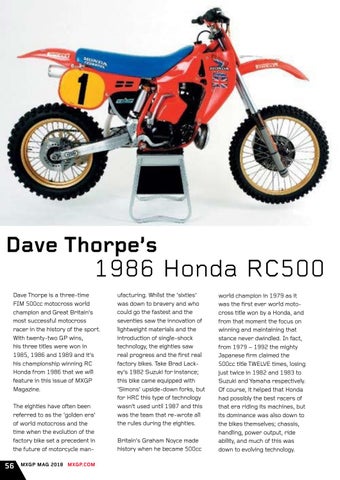Dave Thorpe’s
1986 Honda RC500 ufacturing. Whilst the ‘sixties’ Dave Thorpe is a three-time world champion in 1979 as it was down to bravery and who FIM 500cc motocross world was the first ever world motocould go the fastest and the champion and Great Britain’s cross title won by a Honda, and seventies saw the innovation of most successful motocross from that moment the focus on lightweight materials and the racer in the history of the sport. winning and maintaining that introduction of single-shock With twenty-two GP wins, stance never dwindled. In fact, technology, the eighties saw his three titles were won in from 1979 – 1992 the mighty real progress and the first real 1985, 1986 and 1989 and it’s Japanese firm claimed the factory bikes. Take Brad Lackhis championship winning RC 500cc title TWELVE times, losing The 125cc class in the European Championship usually puts a spotlight on the next ey’s 1982 Suzuki for instance; Honda from 1986 that we will just twice in 1982 and 1983 to thisofbike equipped with big name In fact both thecame 2015 FIM Motocross World and feature in in thismotocross. issue of MXGP SuzukiChampions and Yamaha respectively. ‘Simons’ upside-down forks, but Magazine. course, it helped that Honda vice-world champions Romain Febvre, Gautier Paulin, Tim GajserOf and Pauls Jonass for HRC this type of technology had possibly the best racers of have all won the EMX125 championship on their paths to motocross wasn’t used until 1987 and this The eighties have often been thatsupremacy. era riding its machines, but was the team that re-wrote all referred to as the ‘golden era’ its dominance was also down to the rules during the eighties. of world motocross and the the bikes themselves; chassis, time when the evolution of the handling, power output, ride Britain’s Graham Noyce made factory bike set a precedent in ability, and much of this was history when he became 500cc the future of motorcycle mandown to evolving technology.
56
MXGP MAG 2018 MXGP.COM
